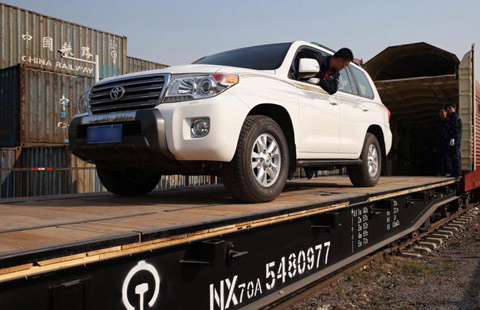Coal heat slumps to cold plight
(Xinhua) Updated: 2014-11-05 15:38BEIJING - Huge deficit and shrinking coal consumption are dragging Chinese coal enterprises into the abyss as the ongoing energy regulations encourage the sector to find a solution.
China's 20 largest coal groups faced total loss of 10.56 billion yuan ($1.72 billion) in Jan-Sept period this year while only seven of them saw meager profits, according to a report by the China Business News.
The deficits expanded along with increasing receivables, which has exceeded 130 billion yuan, mirroring the huge pressure of the capital chain.
Huainan Mining Industry Group, in East China's Anhui province, ranked the top of the deficit list. Its 2014 Q1-Q3 loss hit 4.02 billion yuan, almost five times of the loss from a year ago.
 |
 |
Kailuan Group in North China's Hebei province failed to escape the plight. Founded in 1878 and ranked among the world's Top 500 in 2013, the group's loss in the first nine months reached 2.28 billion yuan, while the net profit was 10.79 million yuan in 2013 Q1-Q3.
The report said their 5 billion ton production capacity attracted heavy investment, with over 3 trillion yuan injected into the coal sector since 2006.
The official data showed the total investment in coal sector was 356 billion yuan by September, declining 3.8 percent from a year ago, much slower than the unusual annual 26.7 growth rate from 2007 to 2011.
China National Coal Association (CNCA) said that the country's coal consumption totaled 3.03 billion tons, a drop of 1.2 percent year on year in Q1-Q3 and the coal production declined to 2.85 billion tons.
Nevertheless, the central government still pledge to tackle overcapacity, deeming the structure and energy regulation the only method to help coal enterprises.
The National Energy Administration announced on Oct 28 that new coal mining projects will not be approved in East China, new coal mines with annual output of less than 300,000 tons and 900,000 tons for coal and gas outburst mines respectively are forbidden anywhere in China.
The measures continued the policy to cut the overloaded capacity and inventory for Chinese coal enterprises, said Zhao Jialian, head of China Coal Economic Research Association.
Wang Xianzheng, CNCA's director, said that China's coal overcapacity has exceeded over 300 million tons by the end of September this year, which resulted in excessive supplies, production safety risks and ecological threats.
Zhao said that the sector should not count on using more domestic coal productions to fill the shortage caused by shrinking coal imports.
"The plight will remain in the sector for a longer time," he said. "Environmental protection and inventory pressure will keep forcing coal enterprises to cut overcapacity and adjust industrial structure."
- PPG to boost orders from Henan Billions
- Carving reshapes local economy
- More than 40% of China's arable land degraded
- Head of Uber Asia: provide values for car owners and riders
- Economic growth to further moderate in 2015 and 2016: UBS
- Cross-border yuan settlement rising: BOC report
- Banks expect cross-border yuan use to accelerate
- China, Qatar vow to deepen oil, gas cooperation
















